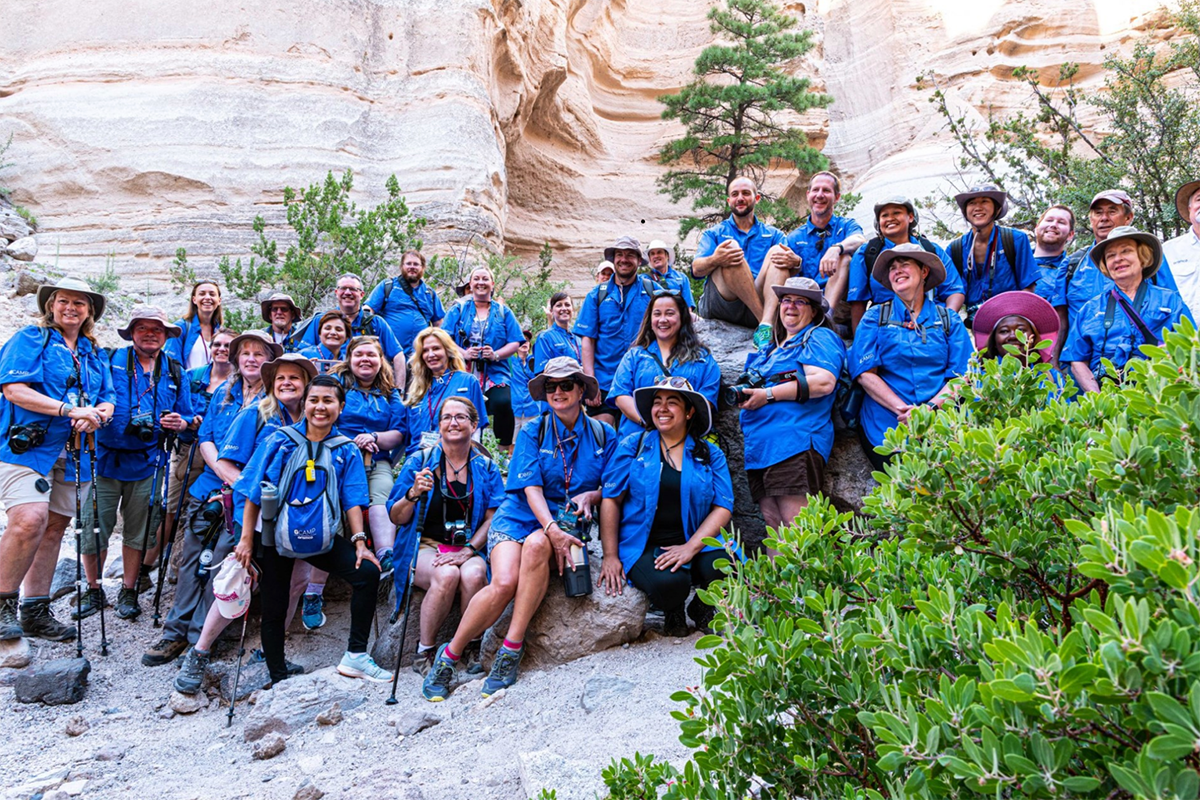A Field Camp for 5th-12th Grade Science Teachers

What is G-Camp?
G-Camp is a 16-day field camp for 5th-12th grade science teachers that provides firsthand experience with the principles of geology in the field, helps you develop new curriculum and virtual field trips for your classroom, and makes outdoor learning fun and exciting. This field experience takes place in Texas, New Mexico and Colorado at locations such as an outcrop, the slope of a volcano, the footwall of a fault, a spectacular glacial valley, the toe of a landslide and a pristine flowing stream.
The dates for this year’s G-Camp are July 11-26, 2026. Attendees need to arrive in College Station on Saturday afternoon/evening of July 11th. We will spend 2 days on campus providing a basis for looking at, describing, and interpreting rocks. We will leave on Tuesday morning July 14 for a 13-day bus tour about the geology of Texas, New Mexico, and Colorado. We will return to College Station in the early afternoon of Sunday July 26.
Participants are responsible for their own transportation to and from College Station; however, all travel expenses (bus, hotels) during G-Camp will be covered, and teachers who complete the requirements will receive a stipend to cover meals during G-Camp.
G-Camp will provide teachers with an introduction to the principles of geology, as well as the opportunity to develop and share curriculum materials to teach the standards required for 5th grade through 12th grade. During the trip, we will explore geologic landscapes, volcanic features, ancient marine deposits, sand dunes, faults, glacial landscapes, streams, landslides, energy resources and mineral resources. G-Camp will travel from College Station through north Texas to New Mexico, Colorado and back through New Mexico. We will go from slightly above sea level to elevations higher than 13,000 feet. The views and knowledge will take your breath away!
We travel by commercial bus to each field location and stay in motels along the way. Although we will not be walking long distances each day to reach outcrops and landforms, being able to walk several miles during the day at high elevations is a requirement for participation in G-Camp.
Applying for G-Camp
The first step is completing the application and submitting it along with two letters of recommendation. Please give your references as much time as possible to respond to your request for references — apply early!
APPLICATIONS ARE DUE APRIL 1, 2026.
Applications are now open. Approximately thirty teachers will be selected for G-Camp. The staff will evaluate the applications and determine the teachers selected.
So, what are you waiting for? Complete your application for G-Camp today! The exciting world of geology awaits you.
If you have any questions, please contact Michael Pope at mcpope@tamu.edu.
Teachers, please Apply Here for G-Camp 2026
G-Camp Staff
Mike Pope
Carolyn Schroeder
Kevin Gamache
Scott Azar
Scott is a passionate educator who has been teaching for 14 years. He currently teaches Earth Science and Intro to Research at a high school and an alternative education high school in the Bellmore-Merrick School district, where he is also a District Technology Mentor. He has a B.S. in Earth Science and Adolescent Education from SUNY Oneonta, an M.A. in Long Island Geology and Adolescent Education from Stony Brook University, and a second M.S. in School and District Leadership from Mercy College. He is currently a doctoral student at Long Island University, studying innovative and transformative education.
Scott was recently inducted as a New York State Master Teacher. He is passionate about supporting teachers and teaching science well. He is also a strong advocate for the use of effective educational technology usage, which he believes allows students to develop critical thinking skills and real-world problem-solving skills.
